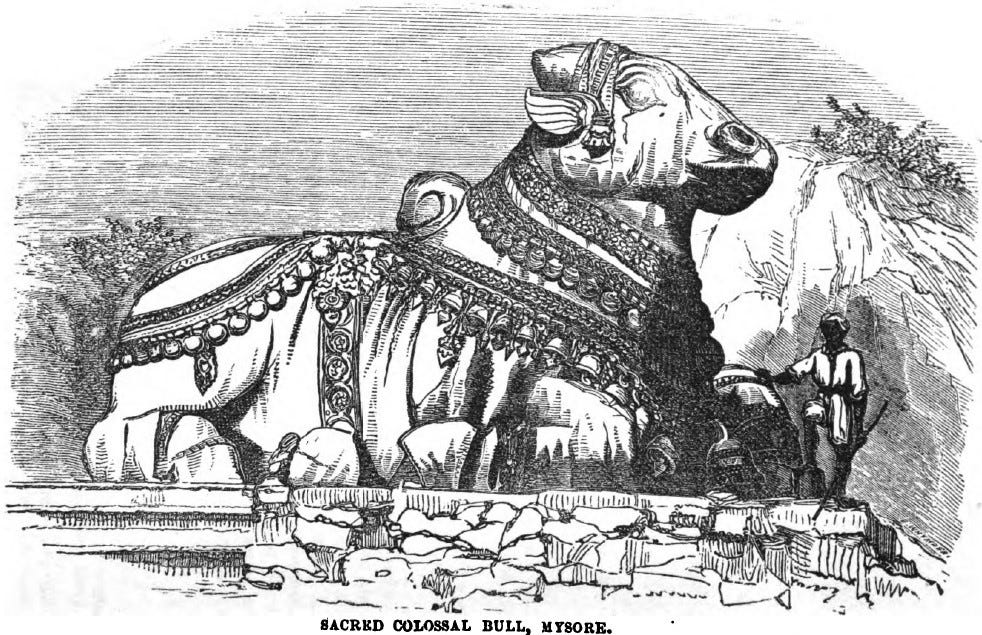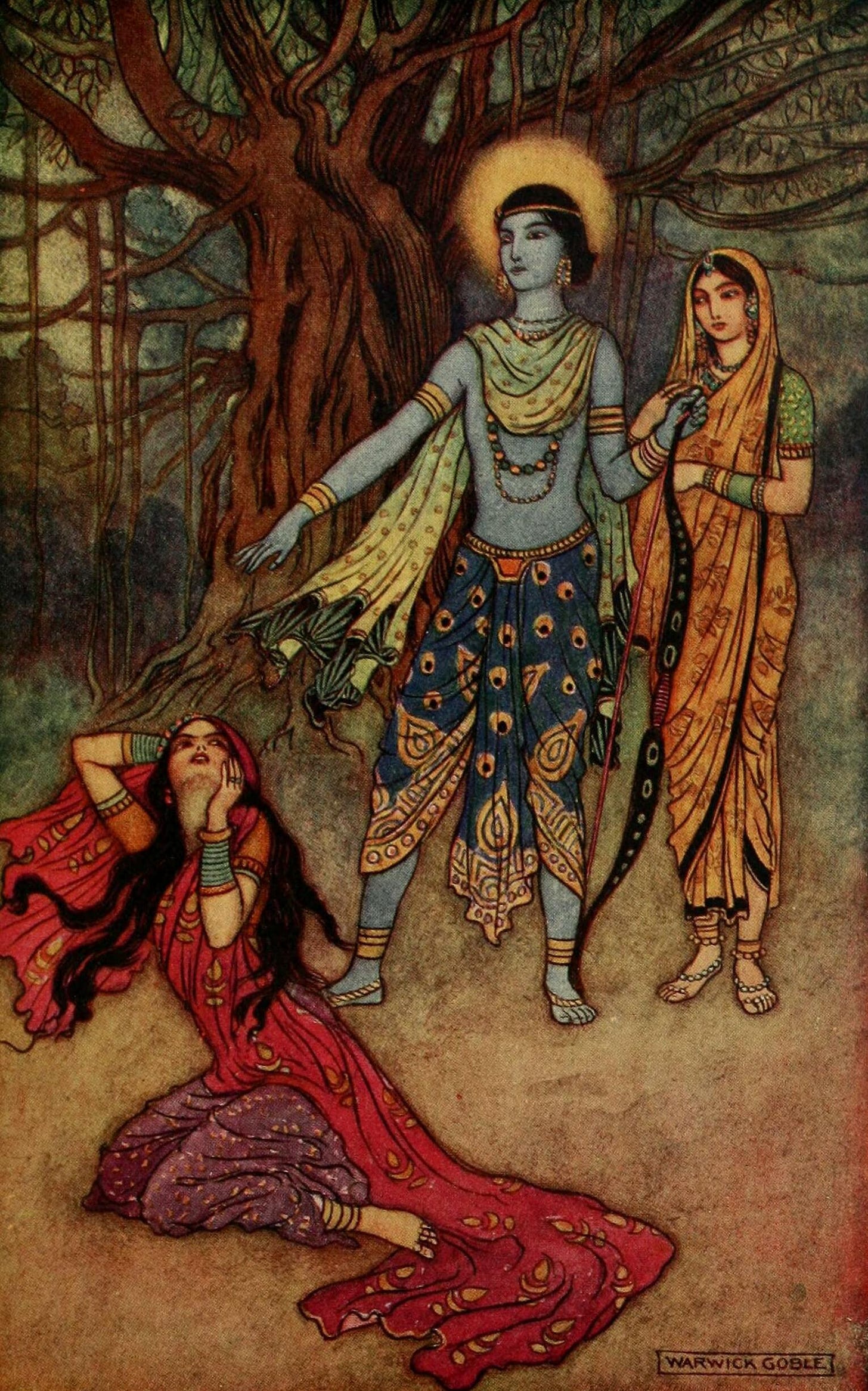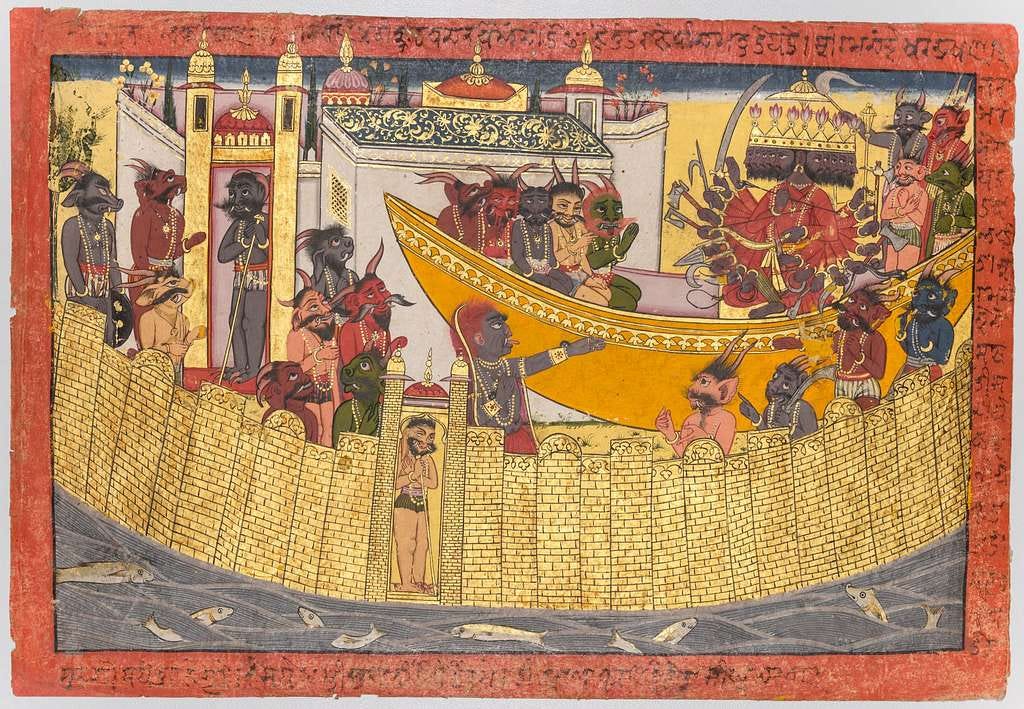An ancient and layered tale retold.
Once upon a time, in the ancient ages, a father sought a suitable match for his daughter to ensure a powerful heir. He identified a Brahmin sage, already married and father to the demi-god of wealth, K., as a potential suitor. Despite the daughter being a demoness, the sage agreed to marry her.
The wife gave birth to several sons and a daughter. As she raised them, she regaled them with her angst at the demons' consistent defeats in battles against the demi-gods and gods. This created an indelible impression on the minds of her children, and developed, at least in the oldest, a determination to best the gods.
As he was also the son of a Brahmin sage, he became a learned scholar, studying the Vedas and scriptures available at that time. He then decided to approach the Creator-God to gain power, and thus, performed austere penance, including offering his head in sacrifice.
He offered his head ten times, and each time it reappeared. Pleased, the Creator-God then granted him invincibility against all demi-gods and gods, along with the ability to shape-shift. He also retained the ability to bear ten heads at will in reward for his devotion. Believing humans posed no threat to him, he omitted them from his prayer for invincibility.
The minute he won these boons, he drove his demi-god half-brother, K., out of the land of their father, and usurped power and became King. He also seized K’s magical flying chariot which could travel anywhere.
He ruled with an iron fist, using his newfound powers to dominate everyone on Earth and in the Heavens. His dominance brought opulence, and he lived unchallenged in that land, accompanied by his brothers and sister, while building himself a golden city.
Once, while returning from a trip to the Gods, his flying chariot suddenly stalled near the Himalayas, forcing him to descend and land.
Puzzled, he sought answers from the nearest being he could find, who happened to be Nandi, the speaking bull guarding the mountains where the Destroyer-God, Shiva, resided.

Nandi explained that Shiva and his wife, the Goddess of Power, were residing in the Himalayas at Mount Kailash, their sacred abode, forbidding anyone from flying over the mountains.
Unimpressed with this information, the humanoid son of the demoness, drunk with power, resolved to carry the mountain of the Destroyer-God to his own land. Using his immense strength and boon of invincibility, he decided to put this idea into action.
He approached the base of Shiva's mountain, intending to lift it from its foundations. His attempts made the mountain shake ever so slightly. Sensing this disturbance, an angered Shiva pressed down on it with just one toe, anchoring the mountain firmly in place.
The proud King, nearly crushed by the weight of the descending mountain, cried out in pain. This is how he came to be known by the name Ravana, meaning 'one who roars.'
Trapped beneath the mountain for a thousand years due to his foolhardiness, he turned to prayer, praising Shiva, and seeking forgiveness.
He initiated an even more severe penance to win the favor of the Destroyer-God. Yet, when his efforts did not suffice to appease Shiva, he intensified his penance further, vowing to die in pursuit of Shiva’s grace.
He composed an immensely powerful hymn to Shiva and began to sing it, accompanied by a unique stringed instrument he fashioned from his own veins.
It was a penance never before witnessed anywhere.
His ode to Shiva vividly depicted His majestic and fearsome aspects, delving into great detail about His various forms. It celebrated Shiva's cosmic dance with His consort, the Goddess of Power, and His transformative dance of destruction that heralds the end of the universe.
At last pleased, Shiva appeared before him, calling him Ravana, and releasing him from the weight of the mountain.
Shiva restored Ravana’s form and made him whole again. Ravana sought special gifts from Shiva, who had no choice but to bestow them on his ardent devotee.
Emboldened with even more power, and convinced there was no equal to him in all the worlds, Ravana returned to his land.
His foremost duty was to his demon brethren, aiming to alleviate the pain his mother had endured from the demons' defeats in years past. The era of losses was over.
Demigods and gods were no match for him now, and humans wouldn't dare oppose one who had triumphed over the gods.
As fear of him spread, Ravana’s pride only grew. He crowned himself King over all he conquered, reveling in the extent of his unmatched power. His siblings too gained power and freely took whatever they desired.
Where Ravana ruled, worship of the Gods ceased to exist, and sages sought refuge in hiding from the tyranny of the demon King.
This went on for many years.
Then, one day, during an aerial tour that took her farther than ever before, Ravana’s sister encountered a human whose dazzling appearance enchanted her. Spellbound, she descended from the skies and concealed herself among the trees to observe him.
What she saw ignited an immense attraction to this human, overwhelming her. Who was this handsome man with a face like the moon, a tall warrior's stature, standing by the tree and gazing at the river?
She could contain herself no longer - she must have him for her husband.
She immediately withdrew into the forest where, utilizing her ability to transform, she changed into a beautiful woman and returned to the area.
But the human was no longer there. She became agitated, and began to search for him.
She eventually found him by a tree, further down, engaged in soft conversation with a beautiful woman. His gentle expression and the smile he bestowed upon his companion transformed him from a mere handsome stranger into an utterly enchanting prince.
Jealousy flared in her heart at the woman who evoked such tenderness in him.
She approached the private scene, and, addressing the man, declared, “Dear human, I am utterly taken with your handsomeness. Make me your wife, for I cannot bear another moment without you.”
The man and woman were taken aback as a beautiful lady suddenly appeared before them and spoke these bold words without any preamble.
Rama took a step in front of Sita, shielding her, to address the demoness. 'You are mistaken. I am already married, and this lady beside me is my wife. I cannot take another wife. Please leave this area.'"
The demoness, unwilling to relent, and mindful of her own beauty, became coy, as she asked Rama to reconsider and take a second wife.
Rama shook his head, stating firmly that such a request was impossible.
Instead, he kindly suggested that she approach his brother, who was standing yonder by a distant tree; perhaps he might consider her suggestion.
The demoness hesitated. She was mesmerised by Rama. Would his brother be as handsome? Seeing the resolute expression on Rama’s face though, she decided to take her chances with his brother.
She slowly approached the younger brother, also a prince, and made her request of him, just as she had of Rama.
Lakshmana at first thought she was joking and laughed. The demoness became angry at his reaction. She had taken care to appear beautiful and did not deserve such a dismissive response from a mere human. After all, she was the sister of the mighty Ravana.
In anger, she demanded that Lakshmana marry her, but he refused.
She then rushed back towards Rama with the intent to harm Sita, as she believed her to be the cause of their refusal to wed her.

Once more, Rama stepped in front of Sita to protect her, while she cried out in alarm at the terrifying expression on the demoness's face as she rushed towards her. However, by then, Lakshmana had caught up to the demoness.
Since she was a female, he chose not to kill her; instead, he cut off her ears and the tip of her nose as punishment. The demoness shrieked and reverted into her original scary form.
She screamed again at the insult and injury, warning the two brothers of the consequences of their actions. Hurling abuses at them and Sita, she disappeared into the sky; after all, demons could fly.
Rama inquired of Sita if she was okay, and he could see that she was shaken, though she nodded her head. This was her first encounter with a demon.
Rama then motioned to his brother to wait while he escorted Sita back to the hut. After ensuring her safety, he returned to talk to his brother. They discussed the situation and decided they should stay on guard in case the demoness returned.
Return she did, and this time, brought with her, two of Ravana’s younger brothers, who controlled the nearby forests.
In the ensuing battle, Rama killed one of the brothers, while the demoness disappeared with the other.
Fearing Ravana’s potential reaction to his younger brother’s death, the demoness ran to him, crying and injured, and began to embellish the story.
Ravana, who was in Court at the time, was deeply disturbed by the pitiful state of his dear sister. He grew so enraged that the Court shook, and he ventured to find out who dared to inflict this injury upon her.

The demoness seeking revenge described to her powerful brother the scene of the two ordinary humans in ascetic garb and their small huts by the forest. She sought to minimize her role in the drama and exaggerate their deeds.
However, she saved her most impactful news for last: she described to her brother that these seemingly unworthy and quite ordinary humans had with them the most beautiful woman on Earth, a woman who deserved to be with a King like her brother and whose beauty would shame even the demigods in heaven.
She began to poison Ravana’s mind with the idea that the best revenge for her insult was to take from Rama, an ordinary human, what he had no right to possess - a beautiful and uncommon wife.
Ravana rose from his golden throne.
The more he heard of the beauty of this woman, the more he began to covet her. His mind started to envision the joy he would feel at winning such a woman over. Gradually, his desire for her surpassed the need for mere revenge.
He called for his cousin, a magician, and devised a plan with him to distract the brothers while he kidnapped the wife.
From not knowing the existence of this woman mere minutes ago, it became an instant obsession for Ravana to possess her. His sister recounted that she was called 'Sita' by the human, Rama. Apparently, he had only an ordinary bow and arrow.
With just two puny humans guarding her, it would be child’s play, Ravana thought, to make her his Queen in no time.
He twirled his mustache slowly in anticipation of kidnapping Sita.
This is a prequel to the below story.






I love this story of Shiva and Ravana!
Another wonderful retelling, Jayshree! Strange that so many gods, be they Indian, Greek, Roman, or Norse, would be so heavily invested in us lowly humans. Don't they have anything better to do?